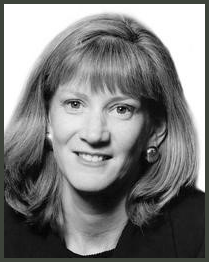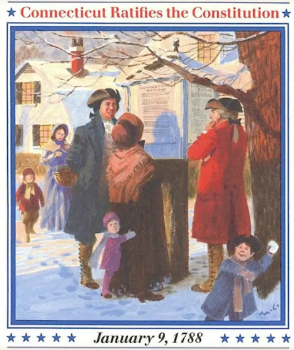From Paddi's Desk
by Paddi LeShane

Five days and ticking! As you more than likely heard, next week the CT legislature is supposedly going to finally address Governor Lamont's plan for upgrading and improving CT's infrastructure (aka bridges and highways).
The jury is still out as to the Senate's desire to make it happen, and even in the House there seems to still be some uncertainty of the support from the Fairfield County legislators.
I don't want to get into the weeds on the issue of tolls and/or the special session outcome. However, I do think there are some interesting facets to focus on. CT has a democratic legislature and democratic Governor, both who were elected by a sound majority of CT voters. The challenges that a major party dominance faces brings an interesting perspective on the next three years ahead for CT.
The old way of thinking is, "We have the solid majority in both chambers of the legislature and in the governor's seat so if the governor announces a policy initiative, of course it will pass the legislature." Maybe it will take a few tweaks here and there and vice versa if either caucus, or even better both caucuses, of Democratic members introduce a policy initiative. After that, one would think that clearly the Governor, after some possible some minor tweaking, will support their initiative.
Well, that is just not the case. Why, you ask? Just look at the dozens of invitations for leadership PAC fundraisers popping up in any politically active CT resident's inboxes these past several weeks. It's not just the caucus leadership anymore who can have power, it's also the folks who want to control a section of the House or Senate caucuses. I'll admit, it's mostly House fundraisers popping up since the New Year arrived, but it's just not the same. Folks are no longer dependent on their caucus leadership to help them win elections or even win re-elections. Legislators are pulling together collaborations of other like-minded legislators and helping that segment get re-elected. Therefore, if they decide to run for a leadership position or even indirectly help someone else win a leadership position, they can be part of the "agenda setting" tribe.
Much like their federal colleagues in D.C. who have organized this way for decades, it's finally arrived in Hartford. That being said, I'm not sure it's a great improvement to further an initiative of working together to get solutions to CT's problems. Whether those problems be taxes, state spending, the size of state government, housing, the economy, social services, healthcare or whatever they may be.
When there is no clear leadership, then its leadership by committee and we all know how that turns out. Nothing gets done and if it does, it's fraught with unworkable ideas that are not well positioned for success and usually makes the problem a bit worse than if there were a top-down leadership model.
Imagine if a physician wasn't the "captain of the ship" in the operating room. Imagine that anyone there could second guess them, insist that their idea should be incorporated into the surgical procedure or refuse to play their designated role unless their suggestion, idea or proposal was included. I really would not want to be that patient in that operating room, that's for sure.
So while I'm a big fan of collaboration and inclusiveness in my own leadership style, there is a time when after folk's ideas, recommendations, comments, suggestions and desires are heard that everyone has to put the patient first and get the job done. Wouldn't you agree?
So in the next week, if the legislature proceeds with approving a toll funding mechanism to solve CT's infrastructure needs, let's not prejudge those who vote in favor or oppose it. If they have expressed their opinions and made efforts to improve what's on the "operating table," let's put our faith in them and hold accountable the real leader in the room. That leader is the Governor, who ultimately cuts the deal and signs the legislation. In a short 11 months, CT voters have the ability to send new representation to the legislature on Nov. 3, 2020. If that's doesn't work, then they can as a voter can work towards cleaning house.
But second guessing what's best for the patient or refusing to play your role in the operating room just isn't what I'd consider a productive democracy, even if freedom of speech allows for one person's opinion.
So, that's what I think! Fingers crossed next week works out best for
Connecticut and not one chamber, one party or one leader. Go for it.
|
|
CT Agency Corner
Department of Public Health - Vaporizing Vape Pens For Good?
by Michael Johnson
The Department of Public Health announced that 46 Connecticut residents have been hospitalized with lung injuries associated with using e-cigarettes or vaping since August.
Consistent with national changes in reporting cases of E-Cigarette and Vaping Product use Associated Lung Injuries (EVALI) by the federal Centers for Disease Control and Prevention (CDC), Connecticut's DPH will now only be reporting cases that result in hospitalization. In addition, all future vaping related lung injury updates will be provided through a new information page on the DPH website that will be updated weekly.
According to the federal Centers for Disease Control and Prevention (CDC), as of December 10, 2019, a total of 2,409 hospitalized cases have been reported from all 50 states, the District of Columbia and two U.S. territories (Puerto Rico and U.S. Virgin Islands). The CDC also reports there have been 52 deaths confirmed in 26 states (including one in CT) and the District of Columbia.
Tied to this news is the development that DPH will be moving forward with legislation attempting to eliminate flavored vape pen cartridges from being sold in CT. At the same time, the Trump Administration has even moved forward with a potential regulation change that would do the same thing nationwide.
This topic of what restrictions will exist for those looking to vape will certainly be one of the bigger issues during the 2020 session.
|
|
Did You Know?
This Week in CT History
January 9, 1778
Connecticut Votes to Join the United States

After declaring American independence in 1776, the Continental Congress had enacted a loose and largely non-binding document, the Articles of Confederation. Soon, the inherent flaws of the Articles of Confederation became dangerously apparent. Without a strong central government, the Congress was unable to collect tax revenue and had little power to set national economic policy, which resulted in states imposing import taxes on each other. Connecticut was hit especially hard by these interstate taxes.
Soon after the U.S. Constitution was sent to the states for ratification in September 1787, the Connecticut General Assembly issued a call for statewide delegates to gather in Hartford to discuss ratification. The promise of no more interstate import taxes was all the convincing delegates needed to support a new federal government. Other, more politically-minded voters were confident that Connecticut's interests would be properly represented in the new Congress, which would now be comprised of both a Senate and House of Representatives thanks to the "Connecticut Compromise."
On January 9, 1788, Connecticut's delegates to the convention held to ratify the proposed new government voted in favor of the U.S. Constitution by one of the biggest majorities of any state: 128 to 40. Before the summer of 1788 was over, eleven states ratified the new document, and the Constitution became the law of the land the following year.
|
|
 |
|
|
 |
|
Municipal
Roundup
by Ryan Bingham
In Norwich, Mayor Peter Nystrom gave the city's annual "State of the City" address this week. The Mayor touted Norwalk's economic development while advising members of the City Council that more work is needed to make the most of both public and private investments. He talked about promoting economic growth through a new round of local business grants, the cleanup of blighted properties and regulatory changes that could boost tourism through short-term rentals.
He also pointed to two laws enacted recently by the state legislature that could be used to address blight. One of the laws promotes the remediation and sale of contaminated sites known as brownfields and the other provides for court-appointed conservators to bring residential, commercial and industrial buildings into municipal code compliance when owners fail to comply.
Mayor Luke Bronin, Hartford's Chief Elected Official, was sworn in this week and delivered his goals for his new term. "My pledge to you is the same one that I've made before," Bronin said. "To work my heart out to try to do the right thing, to always welcome criticism but to never be distracted by those who make a habit of negativity, and to worry less about what's popular or easy and more about what kind of city we're going to leave to our kids."
Bronin won his re-election by a wide margin in November, capturing 77% of the vote in a six-way race. After two years of a budgetary crisis and two more under financial constraints, the Mayor suggested that the lean times are not over. There are tough financial decisions ahead, and very few easy ones, Bronin told those gathered at City Hall for his inauguration. He vowed to work in partnership with the city's schools, businesses and residents to forge the right path forward.
|
|
 |
|
2020 Behind the Scenes
by Chelsea Neelon
With the start of the legislative session right around the corner, our "behind the scenes" interviews with members of CT's General Assembly are back in full swing!
This week, we featured Representative Leslie Hill who represents the 17th House District.

What motivated you to run for office?
I was first motivated to run for office in 1976, on my 5th grade field trip to the Capitol. My teacher was Nikki O'Neil, wife of then-Representative, and later Governor, William O'Neill. Watching the House in session, I was captivated by the seriousness of the debate. In 2018, after serving on Canton's Board of Education for 8 years, and 3 years as First Selectman, I believed I had experience that would benefit my constituents and felt ready to run.
What are some of your legislative priorities this session?
My biggest legislative priority is to continue to fight for fiscal responsibility and Connecticut's economic resurgence. We must support the growth of our small and mid-sized businesses, which are the lifeblood of the towns in my district. I am also dedicated to issues impacting our school districts and students, and our most vulnerable residents: our seniors and those with disabilities.
Last question! What's your favorite hobby?
My favorite hobby is my lifelong passion for horses and riding. I own a Morgan mare and will begin showing her this year. I also love to garden, hike in our beautiful local Land Trusts, and I am an avid Boston Red Sox fan!
|
|
 |
|
Upcoming Events
Rep. Joe Gresko Re-Election Fundraiser
5:30PM-7:30PM
Tuesday, January 14
Two Roads Brewery
Stratford, CT
Representative David Arconti "109 PAC" Fundraiser
12PM-1:30PM
Wednesday, January 15
Red Rock Tavern
Hartford, CT
Senator Carlo Leone Re-Election Fundraiser
9AM-10:30AM
Thursday, January 16
Officer's Club
Hartford, CT
Representative Dorinda Borer "ACT4U" PAC Fundraiser
Thursday, January 16
11:30AM-1PM
Red Rock Tavern
Hartford CT
Majority Leader Matt Ritter Re-Election Fundraiser
5PM-7PM
Wednesday, January 22
Home of SOTS Denise Merrill, 135 Elizabeth St, Hartford
Representative Jason Rojas Re-Election Fundraiser
5:30PM-7:30PM
Thursday, January 23
Elicit Brewing
Manchester, CT
Rep. Chris Rosario 2020 Campaign Kickoff
6PM-8PM
Thursday, January 23
Omanel Portuguese Restaurant
Bridgeport, CT
Representative Jason Rojas PAC Fundraiser
4:30PM-6:30PM
Wednesday, January 29
Firebox Restaurant
Hartford, CT
|
|
|
 |
|